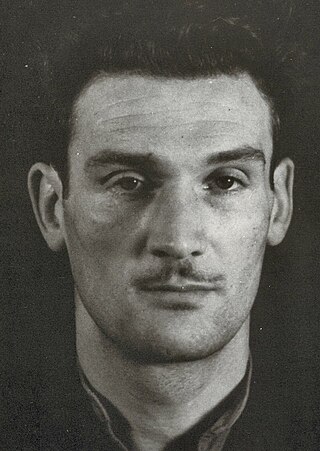
Edward Arnold Chapman was an English criminal and wartime spy. During the Second World War he offered his services to Nazi Germany as a spy and subsequently became a British double agent. His British Secret Service handlers codenamed him Agent Zigzag in acknowledgement of his erratic personal history.

Arthur Christopher Orme Plummer was a Canadian actor. His career spanned seven decades, gaining him recognition for his performances in film, stage, and television. He received multiple accolades, including an Academy Award, two Tony Awards, and two Primetime Emmy Awards, making him the only Canadian recipient of the "Triple Crown of Acting". He also received a BAFTA Award, a Golden Globe Award, and Screen Actors Guild Award as well as a nomination for a Grammy Award.

The Limey is a 1999 American crime film directed by Steven Soderbergh and written by Lem Dobbs. The film features Terence Stamp, Lesley Ann Warren, Luis Guzmán, Barry Newman, Nicky Katt, and Peter Fonda. The plot concerns an English career criminal (Stamp) who travels to the United States to investigate the recent suspicious death of his daughter. It was filmed on location in Los Angeles and Big Sur.

Stewart Terence Herbert Young was a British film director and screenwriter who worked in the United Kingdom, Europe and Hollywood. He is best known for directing three James Bond films: the first two films in the series, Dr. No (1962) and From Russia with Love (1963), and Thunderball (1965). His other films include the Audrey Hepburn thrillers Wait Until Dark (1967) and Bloodline (1979), the historical drama Mayerling (1968), the infamous Korean War epic Inchon (1981), and the Charles Bronson films Cold Sweat (1970), Red Sun (1971), and The Valachi Papers (1972).
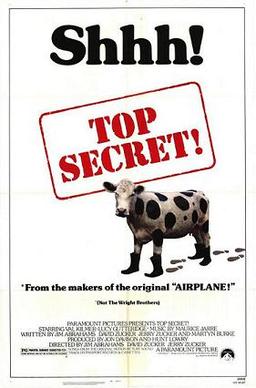
Top Secret! is a 1984 action comedy film written and directed by Jim Abrahams, David Zucker, and Jerry Zucker (ZAZ). It stars Val Kilmer and Lucy Gutteridge alongside a supporting cast featuring Omar Sharif, Peter Cushing, Michael Gough, and Jeremy Kemp.
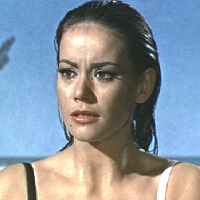
Claudine Auger was a French actress best known for her role as a Bond girl, Dominique "Domino" Derval, in the James Bond film Thunderball (1965). She earned the title of Miss France Monde 1958 and went on to finish as the first runner-up in the 1958 Miss World contest.
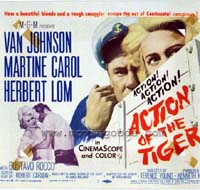
Action of the Tiger is a 1957 British CinemaScope action film directed by Terence Young and starring Van Johnson and Martine Carol. It was distributed by MGM.

Richard Marner was a Russian-British actor. He was probably best known for his role as Colonel Kurt von Strohm in the British sitcom 'Allo 'Allo!.

Thunderball is a 1965 spy film and the fourth in the James Bond series produced by Eon Productions, starring Sean Connery as the fictional MI6 agent James Bond. It is an adaptation of the 1961 novel of the same name by Ian Fleming, which in turn was based on an original screenplay by Jack Whittingham devised from a story conceived by Kevin McClory, Whittingham, and Fleming. It was the third and final Bond film to be directed by Terence Young, with its screenplay by Richard Maibaum and John Hopkins.
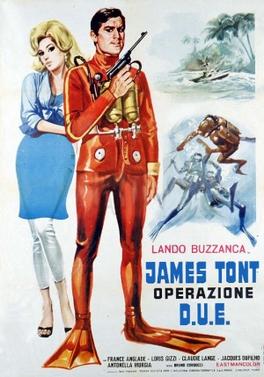
Eurospy film, or Spaghetti spy film, is a genre of spy films produced in Europe, especially in Italy, France, and Spain, that either sincerely imitated or else parodied the British James Bond spy series feature films. The first wave of Eurospy films was released in 1964, two years after the first James Bond film, Dr. No, and in the same year as the premiere of what many consider to be the apotheosis of the Bond series, Goldfinger. For the most part, the Eurospy craze lasted until around 1967 or 1968. In Italy, where most of these films were produced, this trend replaced the declining sword and sandal genre.

The Red Beret is a 1953 British-American war film directed by Terence Young and starring Alan Ladd, Leo Genn and Susan Stephen.

Orders to Kill is a 1958 British wartime drama film. It starred Paul Massie, Eddie Albert and Irene Worth and was directed by Anthony Asquith. The film is based on a story by Donald Chase Downes, a former American intelligence operative who also acted as technical adviser to the film. Downes's story was screenwritten by George St. George and Paul Dehn.
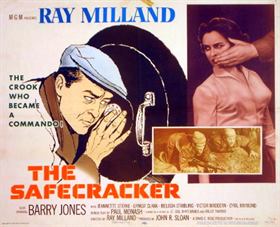
The Safecracker is a 1958 British crime film noir directed by Ray Milland and starring Milland, Barry Jones and Victor Maddern.

Portrait from Life is a 1948 British drama film directed by Terence Fisher and starring Mai Zetterling, Robert Beatty and Guy Rolfe.

Attack on the Iron Coast is a 1967 DeLuxe Color Anglo-American Oakmont Productions international co-production war film directed by Paul Wendkos in the first of his five-picture contract with Mirisch Productions, and starring Lloyd Bridges, Andrew Keir, Sue Lloyd, Mark Eden and Maurice Denham. The film depicts an account of Allied Combined Operations Headquarters commandos executing a daring raid on the German-occupied French coast during the Second World War. The plot is based on the commando raid on the French port of St. Nazaire and is reminiscent of the film The Gift Horse.

Under Secret Orders, also known as Mademoiselle Doctor, is a 1937 British spy film directed by Edmond T. Gréville and starring Erich von Stroheim, John Loder, Dita Parlo and Claire Luce. It is an English-language version of the French film Mademoiselle Docteur, also known as Salonique, nid d'espions, and released in the United States as Street of Shadows, which was filmed at the same time under the direction of G. W. Pabst. Both films have exactly the same plot, but there were differences in the cast between the two: in particular, von Stroheim was not in the French version.

The Treasure of San Teresa is a 1959 British-West German thriller film directed by Alvin Rakoff and starring Eddie Constantine, Dawn Addams and Marius Goring. It was based on a play by Jeffrey Dell. The film is also known by the alternative titles Hot Money Girl, Long Distance, and Rhapsody in Blei.
Escape from Hong Kong is a 1942 American comedy film.

The Exception is a 2016 romantic war film directed by David Leveaux and written by Simon Burke, based on Alan Judd's 2003 novel The Kaiser's Last Kiss. The film stars Jai Courtney, Lily James, Janet McTeer, and Christopher Plummer. The plot is a fictionalized account of the life of exiled Kaiser Wilhelm II (Plummer). When a Wehrmacht officer (Courtney) is ordered to determine whether or not a British spy has infiltrated the Kaiser's residence with a view to assassinating the deposed monarch, he falls in love with one of the Kaiser's maids (James) during his investigation. The film is set in occupied Netherlands during World War II.
The faked sabotage at De Havilland Factory was a successful British deception operation of the Second World War at the De Havilland Mosquito aircraft factory in Hatfield, England. The fake sabotage was conducted during the night of January 29–30, 1943 and was designed to fool German reconnaissance aircraft into believing that a large bomb had detonated inside the factory's power plant. With the help of Jasper Maskelyne, a professional magician, and a team of camouflage experts, replica sub-transformers were created out of wood and papier-mâché, buildings were camouflaged, and debris was littered around the plant to create the appearance from the air that it was damaged by an explosion. Eddie Chapman, a British double agent, was used to inform the Abwehr of the success of the "attack", which is what his German handlers sent him to England to do. The ruse proved successful in fooling the Abwehr, and Chapman was even awarded the Iron Cross as a reward for his work.


















